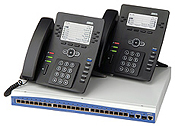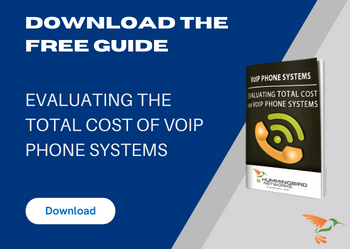What’s the difference between a Hosted and Non-Hosted VoIP PBX solution?
Hosted
Most (if not all) hosted VoIP offerings include both the IP PBX functionality as well as the various Unified Communication (UC) services. The host soft-switch IP platform is housed by a service provider with broadband IP connectivity to the client location(s), by private or public internet networks. A hosted provider delivers services to multiple customers using shared hardware to gain both capital and operational cost benefits. All voice communications, either station to station or outside calls, are controlled and supported by the IP soft-switch in the providers core network. In many cases, phones and adaptors are provided by the hosted service provider and are included in the bundled monthly cost.
Non-Hosted or Premises-based
As the name “premises-based” implies, the PBX and UC services are located on the customer’s premises. With a premises-based VoIP solution it is important to understand that the features and functions integral to UC require the functionality provided by a modern VoIP system, and therefore warrant the upgrade to a IP PBX.
What is the BEST CHOICE for MY business?
The purpose for investing is to increase profitability. There are two broad ways to achieve this namely through enhancing personal productivity and improving business processes.
HostedIn general a hosted solution will have lower up front capital outlays, serve a small and highly distributed organization well, and require fewer in-house management and operational skills. However, it will integrate poorly with the in-house IT infrastructure and data center, this offers much less customizable capabilities, and can get very expensive as the number of end-points grows. A hosted provider offers certain options but is usually limited in the amount of customizations they permit since the whole benefit of hosted is the sharing of a common infrastructure and services across many customers. Other restrictions are inevitable since the hosted system is separate from your data center and business systems. Although the options may be limited, the customer is less burdened by any complexity associated with customization and maintenance.
In the case of a hosted provider, the majority of the equipment costs are for new phones. In some cases, the cost for new phones may be paid for as part of the monthly fee (based on a minimum contract term, typically 3 years). The hosted provider will include a hosted PBX so any on-premises PBX or key-system will need to be retired. The hosted provider will also bill monthly for usage (local, toll and long distance calls), this means in many cases you will have to cancel your current phone plan, which can be costly if you are in any sort of contract with associated early cancellation fees attached. Your network infrastructure will also need to be evaluated and additional equipment may need to be purchased to support the increased bandwidth of the VoIP phones. Installation costs can include upgrades to your internal network and the decommissioning of the existing phone system. If VoIP phones must be purchased, the cost is approximately $200 to $400 per user depending on the phone features desired.

A premises solution may have higher up front costs, but if the pricing window is above three years, the Total Cost of Ownership (TCO) will be lower. The driving forces for selecting a solution to run in your own facilities are to achieve business process integration, company specific customizations, specific features not offered by the hosted solution and having in-house skills and capabilities to fully exploit the systems capabilities. For many companies data security and ensuring there is no data exposure to the outside world may be the single greatest determinant. A final factor favoring a premise-based solution is that it is generally possible to implement it gradually.
Since the end user-owns the system, access to customized features is often greater than a hosted solution. Customization is limited only by the capabilities of the system, user training, and the necessary provisioning. The end-user is typically responsible for the system provisioning, however there is also the option in which the end-user owns the system but the provisioning expertise is provided by a qualified IT service company or the manufacturer of the system.
Cost for a premises-based system is often higher due to the initial cost of the equipment and software. In many cases your current telephone and Internet service that’s in place can remain with no changes. The IP-PBX features and functionality can be implemented in a phased approach with limited affect on the day-to-day operations. The typical cost of a premises-based solution with the IP phones and IP PBX is in the range of $250 to $450 per user.
Bottom Line
Given the operational and personal efficiency benefits, an excellent case can be made for implementing a premise-based solution.There are different driving forces behind such a decision, ranging from having a highly distributed work force appear as a harmonious centralized operation to having customized features that dramatically alter your business practices and appearance to the outside world. When considering the TCO, it should be evaluated over a minimum of a three-year period. While a hosted approach may appear on the surface to allow you to “test the water” due to the lower up-front costs, in practice it may be more of a revolution than an evolution. Finally, if the long-term vision is to enhance business practice and image, then the enhanced ability to integrate with your current business systems and control it provides a compelling reason to select a premises-based solution.
Written by Greg Womack










